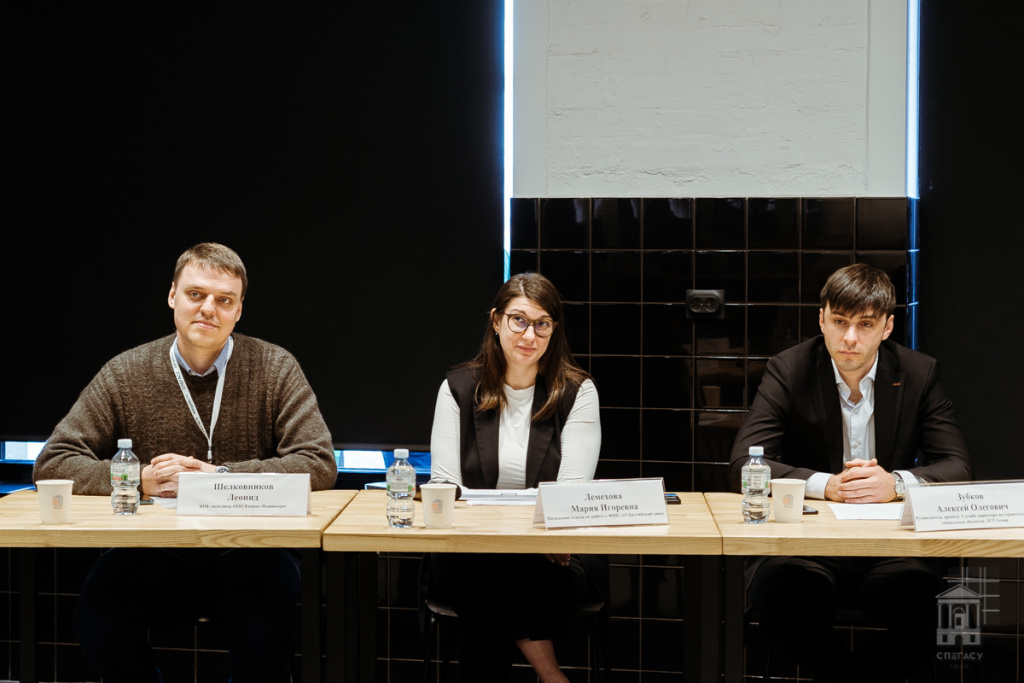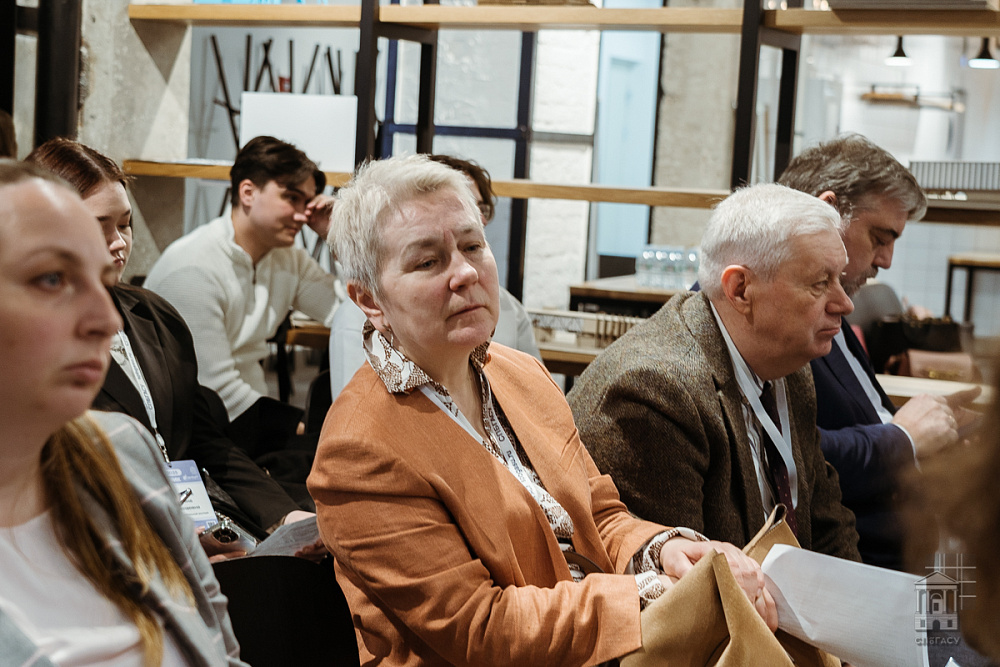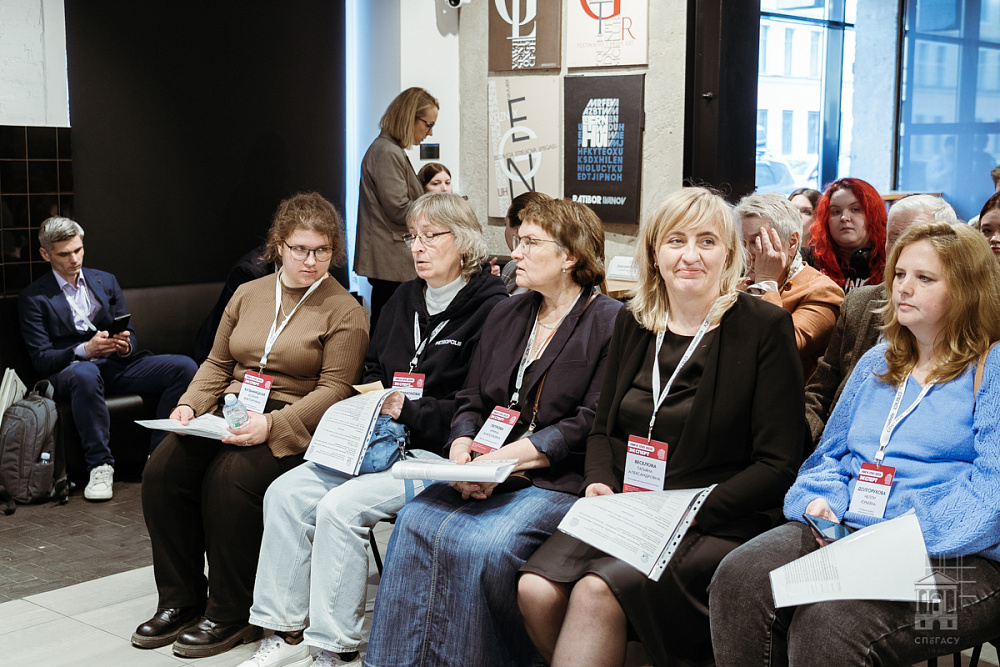On 24 April, SPbGASU held a round table as part of the VIII International Scientific and Practical Conference "Information Modeling in Construction and Architecture" (BIMAC 2025) dedicated to the issues of developing digital competencies of students of secondary vocational education institutions (SVE) in the construction sector.
The event brought together representatives of public organizations, educational institutions, customer companies and students to discuss current trends in personnel training and the implementation of information modeling technologies.
SPbGASU trains personnel together with industry partners
 Polina Fedyuchek, Viktoria Vinogradova
Polina Fedyuchek, Viktoria Vinogradova SPbGASU Vice-Rector for Continuing Education Viktoria Vinogradova said that the university continues to actively work on the application of BIM technologies in the educational process, closely cooperating with leading enterprises in the construction industry, and emphasized that all initiatives at the university - from school projects to scientific developments - are implemented jointly with industrial partners, which ensures the practical orientation of personnel training. She also noted that the university sees itself not just as an educational institution, but as an integration center that unites educational, scientific and project activities. SPbGASU is becoming a platform for professional dialogue between all participants in the construction process - from students to the heads of large companies.
"We are creating an environment where future specialists can gain not only theoretical knowledge, but also practical experience working with real projects," noted Viktoria Vinogradova. "Our partners are actively involved in developing educational programs, organizing internships, and supervising diploma projects." Particular attention is paid to creating conditions for professional growth. The university offers various forms of interaction: from corporate training for company employees to joint scientific research.
"Openness to cooperation is one of our key principles," emphasized Viktoria Vinogradova. "We are ready to discuss new initiatives and joint projects that will contribute to the development of the construction industry and the training of highly qualified personnel who meet the requirements of the digital age."
In conclusion Viktoria Vinogradova invited interested organizations to work together in several areas: the implementation of scientific and design developments, the creation of an open environment for digital projects, and the development of students' project activities. According to her, such a comprehensive approach allows training specialists who can work effectively in the modern conditions of the digitalized construction industry immediately after graduation.
The role of professional associations
Elena Parikova, Development Director – Head of the NOSTROY Project Office, gave a presentation on the experience of the NOSTROY SPO Consortium in the field of digital competencies formation. She emphasized the importance of information modeling technologies and presented the consortium's initiatives in this area.
Particular attention was paid to personnel training. Elena Parikova noted that the industry is facing a shortage of specialists - from 300 to 700 thousand digital personnel. In higher education institutions, TIM programs are implemented in bachelor's, master's and postgraduate programs, including such areas as "Civil engineering" and "Information systems and technologies". In secondary vocational education, the federal state educational standard for the specialty 08.02.15 "Information modeling in construction" has been implemented, which provides training in technical support of TIM, design of structures and management of digital models.
Elena Parikova noted that NOSTROY is also developing additional educational programs, including professional retraining, advanced training, and corporate training. Of particular interest were the projects "Digital construction classes" developed by SPbGASU for schoolchildren, and the online course "From idea to practice of digitalization of the construction industry", developed jointly with the RF Competence Center.
Elena Parikova also spoke in detail about the implementation of the educational initiative "TIM-elective of SPbGASU. SVE League 2025" and the All-Russian TIM-championship of SPbGASU. SVE League 2025. She noted that NOSTROY President Anton Glushkov notes the importance of digitalization of the industry and training of qualified personnel and emphasizes that the championship has become the first all-Russian competition for students of the vocational education system after the approval of the new Federal State Educational Standard (FSES) for the specialty 08.02.15, expressing confidence that the participants will make a significant contribution to the development of the construction industry.
In conclusion, Elena Parikova noted that the development of digital competencies requires joint efforts of educational institutions, businesses and regulators, and invited all interested parties to cooperate.
Deputy Head of the Office of the National Association of Designers and Surveyors (NOPRIZ) Nadezhda Prokopyeva gave a report on the development of a system for independent assessment of the qualifications of specialists in the field of information modeling. In her speech, she emphasized the importance of fulfilling the order of the President of the Russian Federation from 2018 on the modernization of the construction industry through the introduction of TIM technologies.
Nadezhda Prokopyeva noted that NOPRIZ and the Association of Software Developers "Domestic Software" are joining forces to develop BIM technologies. As part of the development of digital competencies in the construction industry, NOPRIZ has entered into an agreement with the Association "Domestic Software", which unites Russian software developers. This partnership is aimed at harmonizing professional standards and qualification requirements with the capabilities of domestic TIM solutions. Joint work will allow adapting independent qualification assessment programs to Russian software products, as well as facilitating the training of specialists who are proficient in national digital tools.
Particular attention was paid to the updated professional standard "Specialist in the field of information modeling in construction", which came into force on 1 March, 2025. The standard establishes five levels of qualification - from technical support of TIM to management of information modeling processes at the organizational level. On its basis, the Federal State Educational Standard of Secondary Vocational Education 08.02.15 "Information modeling in construction" has already been developed, which is implemented by 34 educational institutions of secondary vocational education.
Nadezhda Prokopyeva spoke in detail about the independent qualification assessment system, which has been conducted since 2017 on the basis of Federal Law No. 238-FZ. Currently, examination centers operate in Moscow, Krasnoyarsk, Ekaterinburg, Novosibirsk, Irkutsk and Veliky Novgorod. The exam includes both a theoretical part with questions on the regulatory framework and practical tasks on working with TIM software products.
An important area of work for NOPRIZ is cooperation with the country's leading construction universities to update educational programs in accordance with professional standards. In conclusion, Nadezhda Prokopyeva noted that the introduction of an independent qualification assessment system ensures a high professional level of specialists and increases confidence in BIM technologies in the construction industry.
Polina Fedyuchek, Deputy Director for Development of the Association of SRO "OsnovaProekt", gave a report on the role of self-regulatory organizations in training specialists for the construction industry. In her report, she emphasized the importance of the active participation of self-regulatory organizations in issues of personnel shortage and digitalization of the construction industry.
Polina Fedyuchek emphasized the importance of implementing state strategic documents - the Strategy for the Development of the Construction Industry and Housing and Public Utilities of the Russian Federation for the Period up to 2030 with a Forecast up to 2035 and the Concept for Training Personnel for the Construction Industry and Housing and Public Utilities up to 2035. These documents define the need for digitalization of the industry and the creation of a system of continuous professional education, where SROs act as a link between educational institutions, businesses and regulators.
Particular attention was paid to the implementation of the educational initiative "TIM-elective. SVE League", launched by the Association of SRO "OsnovaProekt" together with SPbGASU in 2024. The pilot project covered six colleges from different regions of Russia, having trained 150 students and 29 teachers. In 2025, the program expanded significantly: now 32 educational institutions are participating in it, including colleges from Moscow, St Petersburg, Novosibirsk, Khabarovsk and other cities. The total number of students reached 787 people, of which 631 are students and 146 are teachers. The program includes 308 hours of training in key areas of BIM technologies: architecture, structures, engineering systems and others. She also noted that these educational initiatives are being implemented with the involvement of exclusively domestic software developers.
"Support for young specialists and development of regional human resources potential remain our priorities," noted Polina Fedyuchek. "Programs like the TIM-elective not only help prepare qualified specialists, but also help reduce the personnel shortage in the regions."
In conclusion, the speaker expressed confidence that further development of the self-regulation system and strengthening of interaction with educational institutions and government agencies will allow for the successful resolution of the challenges facing the industry, including digitalization and training of qualified personnel.
As noted by Leonid Shelkovnikov, Head of the TIM Department of Kairos-Engineering LLC, a teacher at the Perm Construction College, the discrepancy between the qualifications of personnel and the needs of the labor market is a consequence of a major problem - the lack of a unified state approach to the use of information modeling technology, namely the choice of software. Educational institutions at the state level are prohibited from teaching imported software products, but construction organizations are allowed to use foreign software, including with violation of the copyrights of the departed vendors.
"The rapid obsolescence of knowledge due to the rapid transformation of the construction industry, the effective implementation of new technologies in the conditions of "turbulence" of the economy, the lack of dialogue between enterprises of the real sector of the economy and educational institutions - this is what is worth paying attention to in the near future. Growth points lie in the close interaction of educational institutions with the construction industry, the information technology industry. Therefore, it is necessary to move towards the set goals: try to select the required software for the educational process, look for technology partners in the conditions of uncertainty of state policy in the field of application of TIM. At the same time, we are all waiting for the formation of a unified methodology for training TIM personnel in the country, we are trying to convince both students and ourselves of the need to achieve technological sovereignty of the Russian construction industry through import substitution of software products and the applied standards for information transfer," Leonid Shelkovnikov emphasized.
What experts expect from the educational process
 Leonid Shelkovnikov, Maria Lemekhova and Aleksey Zubkov
Leonid Shelkovnikov, Maria Lemekhova and Aleksey Zubkov The head of the educational project of the company "ASCON", the manager of the competence "Technologies of information modeling BIM" of the Agency for the development of skills and professions Olga Chernyadyeva clarified who a TIM teacher is. This is a certified specialist in the main BIM tools, who has experience in solving real problems of the industry and strives to constantly develop along with the update of the functionality of BIM tools and the construction industry.
"The professional skills competitions were created at the request of the industry. The tasks include the basic principles of BIM technologies (multi-vendor, teamwork, work with exchange formats), current tasks and skills in demand by the industry, taking into account current BIM standards and professional standards. As part of the TIM Championship of SPbGASU, training intensives are held on working with BIM tools, as well as on teaching methods," said Olga Chernyadyeva.
She added that BIM management, the StroimProsto hackathon, the Professionals Championship movement, the TIM Leaders All-Russian competition, and the Summer BIM School help develop the competencies of all members of the professional community.
Maria Lemekhova, Head of the Department for Work with the Federal Targeted Program at JSC Baltic Shipyard, noted that shipbuilding is also currently implementing BIM technologies and is facing similar personnel problems.
"Shipbuilding, like the construction industry, is unthinkable today without information modeling. At shipyards, we use TIM approaches to create ships, vessels and infrastructure. Our experience can be useful for solving problems in architecture and construction - from design optimization to life cycle management of objects. Digital twins of ships and BIM technologies in shipbuilding are the "marine version" of construction solutions. Integration of approaches will help overcome common challenges," explained Maria Lemekhova.
She emphasized that digitalization of shipbuilding is a key element of the strategy of technological sovereignty. It covers not only the introduction of robotics and automation, but also the transformation of human resources. The transition to the concept of "Shipbuilding 4.0" requires training specialists capable of working with digital twins, ship lifecycle management systems (PLM) and artificial intelligence. The United Construction Corporation (JSC "UCC"), which includes the Baltic Shipyard, is taking steps to restructure the educational system through projects such as "Plant-VTUZ", combining education with practical training at enterprises. For example, students of the St Petersburg Marine Technical University (SPbGMTU) are involved in the creation of digital twins of ships, which reduces the adaptation period for graduates in production.
“Only through the integration of digital platforms, updating retraining programs and creating attractive conditions for young people will we be able to overcome the personnel crisis,” noted Maria Lemekhova.
Construction allows you to leave a mark on history and realize your creative potential, because each project is unique and requires an individual approach, agreed Aleksey Zubkov, project manager of the Service of the director for construction of social facilities of the LSR Group and the SPbGASU graduate.
"LSR traces its history back to 1993 and in 30 years has become one of the leading construction holdings in the country. Now the LSR Group continues to increase construction and production volumes, following a proven strategy and maintaining established traditions. We follow new standards and requirements for the design of buildings and structures, including the use of modern technologies (for example, TIM). And we understand that the most important thing in any company, regardless of its size and profile of activity, is people. Therefore, we pay great attention to our many thousands of personnel, creating conditions for effective work and providing the broadest opportunities for professional and career growth. We will be glad to see young specialists in our teams," said Aleksey Zubkov.
Also, colleges teachers from Perm, Belgorod, Rostov-on-Don, Veliky Novgorod and St Petersburg spoke at the round table and shared their opinions on the educational initiative "TIM-elective SPbGASU. SVE League 2025". The speakers outlined the issues that, in their opinion, need improving by next year, and thanked SPbGASU and the SRO Association "OsnovaProekt" for organizing such an interesting and significant event.
The participants of the round table agreed that the development of BIM technologies requires close interaction between educational institutions, businesses and regulators. Particular attention was paid to the need to adapt educational programs to rapidly changing industry requirements.
The event became a platform for exchanging best practices and defining the vector of further cooperation in the field of digitalization of the construction industry.





